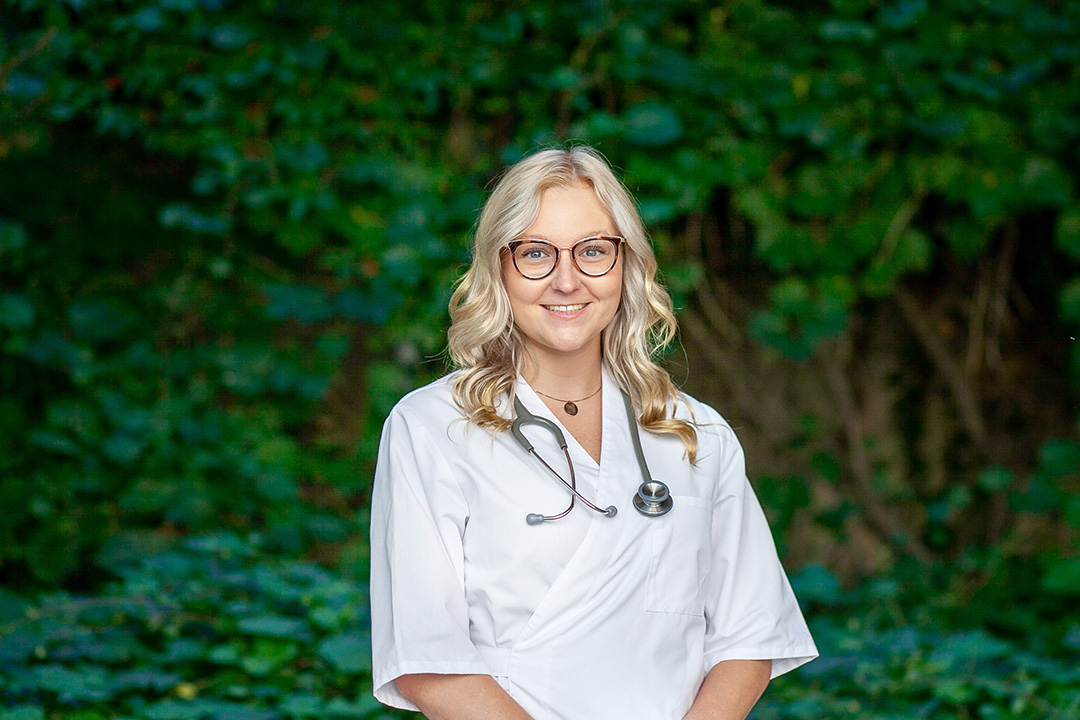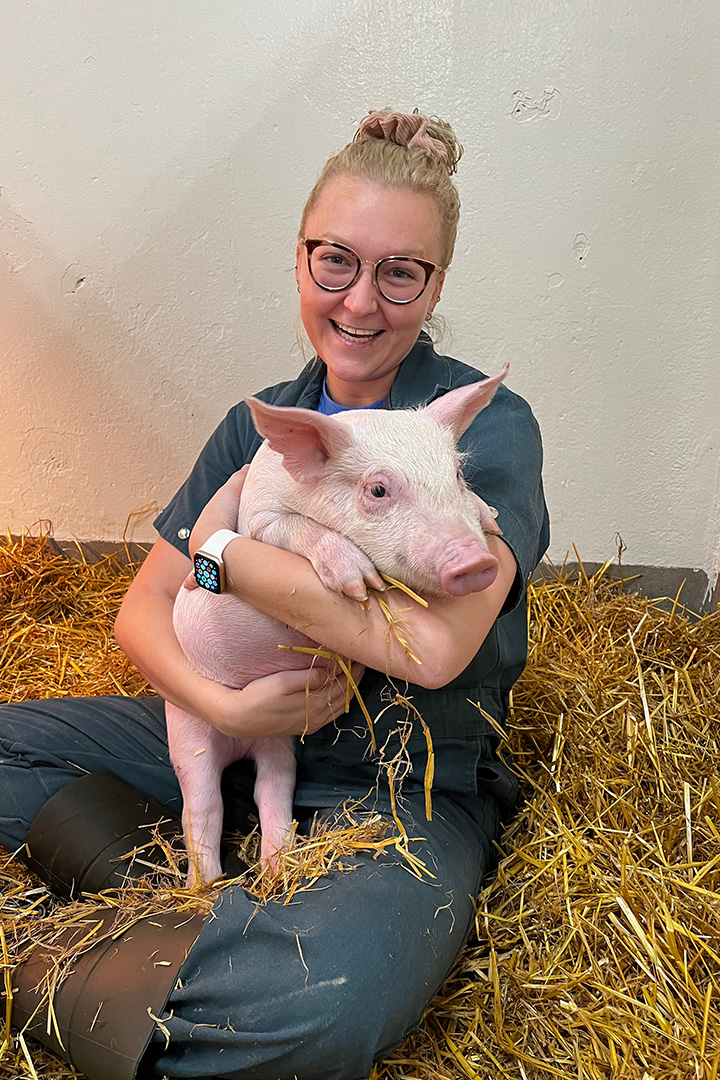
Veterinary student on path to swine medicine earns $5,000 award
Samantha Nixon of Winnipeg, Man., was one of 10 North American veterinary students who each received a $5,000 scholarship on Feb. 26 during the American Association of Swine Veterinarians’ (AASV) annual meeting in Nashville, Tenn.
By WCVM TodayNixon, a second-year University of Saskatchewan (USask) student at the Western College of Veterinary Medicine (WCVM), was the only Canadian to receive one of the awards supported by the AASV Foundation and Merck Animal Health. Initiated in 2016, the annual AASVF and Merck Animal Health Veterinary Student Scholarship program assists the foundation's mission to support the development and scholarship of students and veterinarians interested in the swine industry.
In 2023 after completing her first year of studies at the WCVM, Nixon worked as a summer research student with Dr. Matheus Costa, a swine medicine specialist and researcher in the WCVM’s Department of Large Animal Clinical Sciences, and his research team. During the AASV meeting, Nixon presented a research poster titled, “A comparative analysis of rectal thermometers and thermal imaging cameras for early detection of disease in pigs.”
The study compared temperatures readings obtained from pigs using rectal thermometers versus thermal imaging cameras. Elevated body temperature, which indicates a fever, is one of the first signs that the body is fighting infection. Identifying the onset of fever is crucial for early detection of disease and early treatment interventions. It’s also critical for preventing the spread of infectious disease agents.
While thermal imaging cameras offer a non-invasive and rapid alternative for monitoring pigs’ body temperature, findings gathered by Costa’s research team indicated that thermal imaging is more susceptible to variation and may artificially provide underestimated data.
Nixon has past work experience with pigs and the industry. Before attending the WCVM, Nixon completed a Bachelor of Science (Agriculture) — Animal Systems degree at the University of Manitoba (UM). Her experience in the swine industry includes four years working as a member of the animal health team with HyLife, a Manitoba-based pork producer and global exporter of pork products.

Nixon, who will complete her Doctor of Veterinary Medicine (DVM) program in 2026, is thrilled to be on the path to becoming a swine veterinarian — a career area that offers opportunities for continual learning and professional growth.
“I’m drawn to the diverse responsibilities the profession entails, from routine health checks and vaccination programs to disease management, post-mortem exams and treatment plans. The swine industry is intellectually stimulating with ample research possibilities,” says Nixon.
“I’m dedicated to improving the overall quality of life of pigs by ensuring proper care, disease prevention and humane treatment. A swine veterinarian can make a meaningful difference in animal health, public health, and the agricultural industry.”
Attending the AASV annual meeting has been on Nixon’s list of professional goals for the past few years. Listening to high-profile presenters, connecting with industry professionals and reuniting with previous mentors were all highlights of her time in Nashville.
“I enjoyed the opportunity to stay updated on the latest research, network with colleagues, learn about best practices, and gain insights into the challenges and opportunities that the swine industry is facing,” says Nixon.
Second-and third-year students enrolled in American Veterinary Medical Association-accredited or recognized colleges of veterinary medicine in the U.S., Canada, Mexico, South America and the Caribbean islands are eligible for the AASV scholarship. Click here to learn more about the scholarship program.
"Through our partnership with AASV, we are helping to build students' knowledge of swine health and well-being as they prepare for a career in this important field,” said Dr. Justin Welsh (DVM), executive director of livestock technical services, Merck Animal Health.
"The AASV and the AASV Foundation appreciate Merck Animal Health's long-standing support for the AASVF-Merck Veterinary Student Scholarship Program. Their generous donation enables the AASV Foundation to assist future swine veterinarians with their educational expenses," Harry Snelson, DVM, AASV executive director. "This support has become increasingly important as educational expenses for veterinary students continue to rise."
AASVF and Merck Animal Health Veterinary Student Scholarship recipients (2024)
- Kristen Cleaver, Iowa State University College of Veterinary Medicine, Class of 2026
- Cassidy Cordon, University of Minnesota College of Veterinary Medicine, Class of 2026
- Juan Hernández Cuevas, The Ohio State University College of Veterinary Medicine, Class of 2025
- Megan Neveau Thomas, Iowa State University College of Veterinary Medicine, Class of 2025
- Samantha Nixon, Western College of Veterinary Medicine, University of Saskatchewan, Class of 2026
- Elizabeth Ohl, The Ohio State University College of Veterinary Medicine, Class of 2026
- Kendall Sattler, Purdue University College of Veterinary Medicine, Class of 2026
- Adam Steffensmeier, Iowa State University College of Veterinary Medicine, Class of 2025
- Matilyn Wheeler, Iowa State University College of Veterinary Medicine, Class of 2026
- Mallory Wilhelm, Iowa State University College of Veterinary Medicine, Class of 2026
